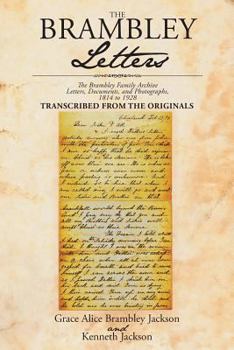The Brambley Letters: The Brambley Family Archive- Letters, Documents, and Photographs, 1814 to 1928
The letters include tragedies of Dickensian nature and scale, but unlike Charles Dickens's tales, they're not fiction. They are supplemented by eighty-six documents, photographs, and ephemera. With one exception, the letters have not been subjected to historians' interpretations and inferences. This provides inquisitive readers the opportunity to form their own inferences and conclusions from primary source documents.
Ebenezer Brambley (1815-1884). Described as a hellfire and brimstone preacher, he brought his wife and nine surviving children to America knowing America was on the brink of war--he knew seven states had already seceded from the Union.
Samuel Brambley (1845-1928). After his mother died in 1889, while his siblings were fighting over the silver service, he collected the family Bible and his father's collection of letters. And family oral history says he never threw away a letter.





